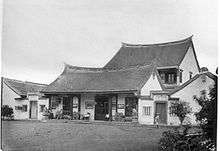Khouw Yauw Kie
| Kapitein Khouw Yauw Kie | |
|---|---|
 Kapitein Khouw Yauw Kie and his younger cousin, the future Majoor Khouw Kim An at Candra Naya | |
| Born | Batavia, Dutch East Indies |
| Died |
1908 Batavia, Dutch East Indies |
| Occupation | Kapitein der Chinezen, bureaucrat, landlord |
| Years active | Late nineteenth century |
| Spouse(s) | Tan Him Nio[1] |
| Children | Khouw Tjoei Nio[1] |
| Parent(s) |
|
| Relatives |
Tan Liok Tiauw Sia (brother-in-law) Khouw Tjeng Tjoan, Luitenant der Chinezen (uncle) Khouw Tjeng Kee, Luitenant der Chinezen (uncle) Khouw Kim An, 5th Majoor der Chinezen (cousin) O. G. Khouw (cousin) Khouw Oen Hoei, Kapitein der Chinezen (cousin) |
Khouw Yauw Kie, Kapitein der Chinezen (died in 1908), also spelt Khouw Yaouw Kee, was a high-ranking, Chinese-Indonesian bureaucrat.[2][3] He was the first scion of the influential Khouw family of Tamboen to serve on the Chinese Council of Batavia (Dutch: Chinese Raad; Hokkien: Kong Koan).[4]
Born in Batavia, capital of the Dutch East Indies, Khouw was the second son of Khouw Tjeng Po, Luitenant-titulair der Chinezen (died in 1883), and was as such a grandson of the tycoon Khouw Tian Sek, Luitenant-titulair der Chinezen (died in 1843).[5][6] He was also a nephew of the landlords Luitenant Khouw Tjeng Tjoan and Luitenant Khouw Tjeng Kee.[6] His father, uncles and grandfather held the honorary rank of Luitenant-titulair der Chinezen, proper to Chinese officials in the civil bureaucracy of colonial Indonesia, but without any of the substantive responsibilities.[7] His family was one of the wealthiest dynasties of the Cabang Atas or the Chinese gentry (baba bangsawan) of colonial Indonesia.[2][6]
As the issue of Chinese officers, Khouw held the colonial hereditary title of Sia.[8] In 1883, Khouw was appointed by the colonial government as a substantive Luitenant der Chinezen with a seat on the Chinese Council of Batavia.[4] He, thus, became the first member of his family to serve as a substantive Chinese officer and to sit on the Chinese Council. In 1887, he also became the first in his family to be further elevated to the higher rank of Kapitein der Chinezen.[9][10] Khouw was in office during the tenure of Majoor Lie Tjoe Hong as the third Majoor der Chinezen and head of the Chinese community of Batavia.[7][10]
Khouw was also noted by a number of foreign visitors to the East Indies. The English aviation pioneer Baden Fletcher Smyth Baden-Powell, brother of Lord Baden-Powell, was a guest of the Kapitein while on a visit to Asia in the late nineteenth century.[11] He wrote about Khouw's sumptuous dinner party during the 'feast of a thousand lanterns'.[11] Another English writer, Arnold Wright, refers in his Twentieth Century Impressions of Netherlands India to Khouw's influence in Batavia.[2]
Today, Kapitein Khouw Yauw Kie is best remembered as one of the former owners of Candra Naya, a historic landmark in the Old Town of Jakarta.[3][12] He was married to Tan Him Nio, daughter of Tan Tiang Po, Luitenant der Chinezen and sister of the landlord and plantation owner Tan Liok Tiauw.[13] The Kapitein died in 1908.[14][15] He was eventually succeeded on the Chinese Council in 1905 by his first cousin, Khouw Kim An, who went on to serve, from 1910 until the latter's death in 1945, as the last Majoor der Chinezen and ex officio Chair of the Chinese Council of Batavia.[7][6]
References
- 1 2 Kan, S.Y. "Tjoei Nio Khouw (± 1896-?) » Stamboom Kan, Han en Tan » Genealogie Online". Genealogie Online (in Dutch). Retrieved 9 April 2018.
- 1 2 3 Wright, Arnold (1909). Twentieth century impressions of Netherlands India: Its history, people, commerce, industries and resources. London: Lloyd's Greater Britain Pub. Co. Retrieved 25 July 2017.
- 1 2 Merrillees, Scott (2000). Batavia in Nineteenth Century Photographs. New York: Archipelago Press. ISBN 9789813018778. Retrieved 25 July 2017.
- 1 2 "Civiel Department (in Dutch)". De Locomotief (199). De Groot, Kolff & Co. 24 August 1883. Retrieved 25 July 2017.
- ↑ "Plaatselijk Nieuws". Bataviaasch Handelsblad (43). W. Bruining. 21 February 1893. Retrieved 25 July 2017.
- 1 2 3 4 Erkelens, Monique (2013). The decline of the Chinese Council of Batavia: the loss of prestige and authority of the traditional elite amongst the Chinese community from the end of the nineteenth century until 1942. Leiden: Leiden University. Retrieved 25 July 2017.
- 1 2 3 Lohanda, Mona (1996). The Kapitan Cina of Batavia, 1837-1942: A History of Chinese Establishment in Colonial Society. Jakarta: Djambatan. ISBN 9789794282571. Retrieved 25 July 2017.
- ↑ Blussâe, Lâeonard; Chen, Menghong (2003). The Archives of the Kong Koan of Batavia. Amsterdam: BRILL. ISBN 9004131574. Retrieved 2 August 2017.
- ↑ "BENOEMINGEN, ENZ. CIVIEL DEPARTEMENT". Bataviaasch Nieuwsblad. Kolff & Co. 24 October 1887. Retrieved 25 July 2017.
- 1 2 Regeerings-almanak voor Nederlandsch-Indie (in Dutch). Batavia. 1888. Retrieved 9 August 2017.
- 1 2 Baden-Powell, Baden Fletcher Smyth (1892). In savage isles and settled lands : Malaysia, Australasia and Polynesia, 1888-1891. London: Bentley. Retrieved 8 August 2017.
- ↑ "Woning, vermoedelijk van de majoor-Chinees, Khouw Yaouw Kee, aan de Molenvliet te Batavia". Media KILTV. Koninklijk Instituut voor Taal-, Land- en Volkenkunde. Retrieved 25 July 2017.
- ↑ Kan, S.Y. "Stamboom Kan, Han en Tan (in Dutch)". Genealogie Online (in Dutch). Retrieved 26 July 2017.
- ↑ "Tweede Blad. Necrologie 1908. Nederland". Het nieuws van den dag voor Nederlandsch-Indië (305). NV Mij tot Expl. van Dagbladen. 31 December 1908. Retrieved 25 July 2017.
- ↑ "Amersfoortsch Dagblad.15 Februari 1908". Historische kranten - Archief Eemland (in Dutch). Retrieved 26 July 2017.